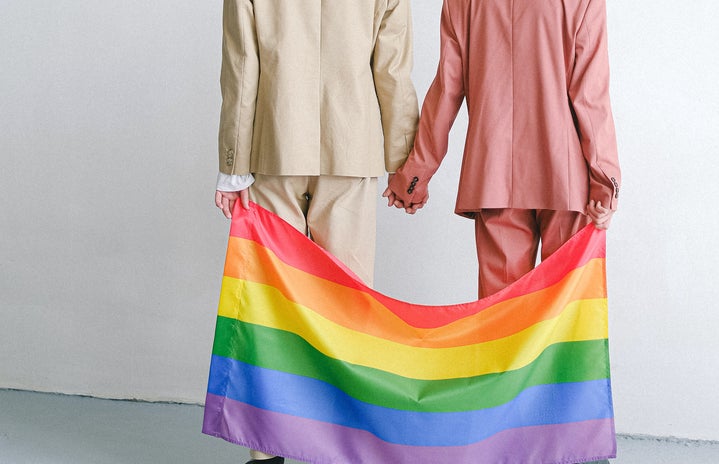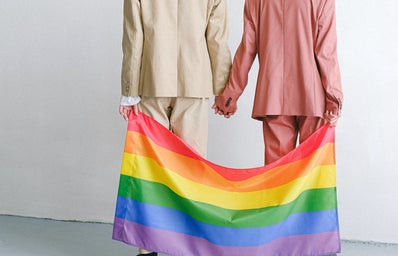Edited by: Maitree Jain
If you are a realist, this novel is not for you. High thigh-highs away from the manic pixie dream girl, August Landry is a realist herself. “Her mental field guide to making friends is a two-page pamphlet that just says: DON’T.” Suspension of disbelief is crucial if you want to enjoy this book. You must be able to believe that you can actually find cute girls on the New York City Subway, not just vermin, marshmallows with algae, and everything puke-inducing in between.
One Last Stop by Casey McQuiston is full of quirky queers: Tattoo Boy Niko with his “signature look of mild constipation”, Myla: “a friend in completion” with her frog ghosts, the nocturnal Wes, the humpy poodle Noodles, cool mom Suzette Landry, drag queen Annie Depressant “Pride of Brooklyn”, Augie the ghost of August’s uncle, punk rock activist Jane Su, and of course, August Landry, who does not trust people, but trusts fried chicken, and carries a pocketknife–August Landry who say things like “Bella Swan, eat your horny little Mormon heart out.”
There is something characteristically didactic about queerness in McQuiston’s books in its portrayal of how it normatively ought to be, but it’s not so much “Hey, learn this about queerness, you performative, heteronormative shit,” it’s more delicately interwoven into the story so much so that even as the narrative progresses, the characters regress into their queer past. McQuiston introduces you to characters as if they’ve lived a full life, albeit in McQuiston’s head, but it works. It’s not like the Bertrand Russell five-minute theory where the characters go in and out of this world—your world—every time a reader picks up the book and then cease to exist outside of the book. I’m almost sure that August exists out there somewhere in the world, spilling coffee over herself and maple syrup over the customers she is waiting on at Pancake Billy’s House of Pancakes, and I’m grateful that she let me live her life alongside her for some 400-odd pages.
Consider McQuiston’s previous novel, Red, White & Royal Blue, where the First Son of the United States–the son first female, Latin American President of the United States–falls in love with the Prince of the United Kingdom. The two novels are alike in terms of the witty banter, but different in terms of creating a utopian world. Red, White & Royal Blue creates an aspirational world, a world that our world can look like in the near future. Although Schitts’ Creek-like in terms of ingraining queerness within the norm, One Last Stop still pays homage to the efforts it took in getting there, the lives we lost, literally, in the 1973 fire at the UpStairs Lounge. Another difference is the overwhelming quantity of how much is happening in One Last Stop compared to Red, White & Royal Blue’s easy-to-digest enemies-to-lovers trope. It’s not that the sci-fi gobbledygook fractures the otherwise heartwarmingly awkward love story, but that there’s no need for it. It’s abruptly introduced into the narrative as the hurdle in our protagonist’s object of desire. August and Jane are perfect for each other, so what could possibly obstruct their love story? Hmm, maybe if one of them was metaphysically thrown out of time… But why a romcom needs science, technology, and everything Marxist in between escapes me.
There’s also something cheeky about the full-circle ending of One Last Stop. At the beginning of the book, “August learns that the Q is a time, a place, and a person.” Towards the end of the book, Jane learns that “August is a time, a place, and a person.” Reading the ending is like when your roommate catches you binge-watching The O.C., but you tell her that you’re watching it “ironically” so you can make fun of ‘the hella stoked SoCalis’ later, (but you’re secretly rooting for Ryan and Marissa to get together). Basically, the ending makes you feel a little guilty for enjoying a corny rom-com that was clever right up until the ending, but “even when it’s bad, it’s good” because, despite the corniness, some of the lines are so Instagramable that you want to read them out to your roommate even while she’s in a group project meeting. Consider this exchange between August and Annie, for example. ‘“Does it ever, like … I don’t know. Make you lonely? To love somebody who can’t meet you there?” She regrets it immediately, but Annie laughs. “Sometimes. But, you know, that feeling? When you wake up in the morning and you have somebody to think about? Somewhere for hope to go? It’s good. Even when it’s bad, it’s good.”’
Reading One Last Stop is like eating banana pancakes, pretending like it’s the weekend on a capitalist Tuesday. The Sapphic paradise of Coffee Girl and Subway Girl, it’s a novel about finding home, be it a time, a place, or a person. And when “[August] hears the snap of a magnet—[Niko has] added August to the fridge” which is full of the roommates’ pictures in their “not not haunted” house in New York, the “shitty, smelly, overpriced, nightmare city”, we know that August has found home. So, if you want to escape from a world where you cannot go to a drag show on Tuesdays, this book is for you.


